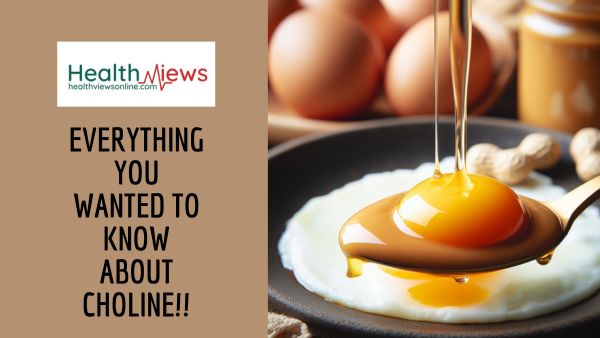Choline is a nutrient that is related to B vitamins. It is produced in the liver. It can also be found in meats, fish, nuts, beans, vegetables, and eggs.
What is Choline? What are its functions?
It is a necessary nutrient. This signifies that it is necessary for normal body function and human health. Though your liver may produce some, you must get the majority from your diet.
Choline is involved in numerous chemical processes in the body. It is essential for the nervous system and the development of appropriate brain function. It may also aid in the reduction of edema and inflammation associated with asthma.
Many people take choline for memory, mental function, preventing certain birth deformities, and a variety of other objectives, although there is little scientific evidence to back up many of these claims.
Also, Read All about Iron: Functions, Daily Dose, Deficiency, Sources & Toxicity
How Much Choline Do I Need? What Are The Recommended Amounts?
The amount of choline you require each day is determined by your age and gender. For males and women aged 19 and up, the adequate intake is 550 mg and 425 mg daily, respectively. The AI for pregnancy and breastfeeding is 450 mg and 550 mg per day, respectively.
A Tolerable Upper Intake Level (UL) is the maximum daily amount that is unlikely to cause adverse side effects in the general population. A UL for choline has not been defined because no hazardous level has been seen from food sources or long-term consumption of high-dose supplements.
What are the food sources?
Choline can be present in a wide range of foods. Meat, fish, poultry, dairy, and eggs are the richest sources.
- Egg yolks
- Chicken breast
- Fish
- Shiitake mushrooms
- Potatoes
- Legumes (beans, peanuts)
- Milk
- Yogurt
- Cruciferous vegetables (broccoli, cauliflower, Brussels sprouts, cabbage)
- Sunflower seeds
Deficiency Of Choline: The Possible Disorders And Their Symptoms
Pregnant women, breastfeeding mothers, and persons with genetic changes that enhance the body’s requirement, may be at risk of choline insufficiency.
Although some individuals assume that vegetarians and vegans are at risk, the data is however conflicting. Soybeans, potatoes, and mushrooms are among the foods with the highest choline concentration. Eating a healthful diet rich in whole foods should be sufficient to prevent insufficiency.
Choline deficiency can lead to the following health problems:
- coronary artery disease
- Alzheimer’s disease and other neurological diseases
- fatty liver illness that is not caused by alcohol
- abnormalities in the neural tube
- muscular deterioration
Although choline deficiency can have detrimental effects on health, too much of it can also result in problems like:
- hypotension
- sweating
- vomiting
- excessive salivation
- liver toxicity
- a fishy body odour
Toxicity: What Happens in Case of Excess Choline?
High choline consumption can cause low blood pressure (hypotension) and liver damage. It may also increase TMAO formation, which is linked to an increased risk of cardiovascular disease. Excessive sweating, fishy body odor, and nausea/vomiting are also symptoms.
Based on the quantity demonstrated to induce these deleterious effects, the Tolerable Upper Intake quantity (UL) for choline for persons 19 and older is 3,500 mg daily. This large amount would most likely be obtained by the use of very high-dose supplements rather than through eating alone.
Check out the Food Nutrients section on Health Views Online where we talk in detail about different vitamins and minerals.
Also, Read All about Calcium: Functions, Daily Dose, Deficiency, Sources & Toxicity





